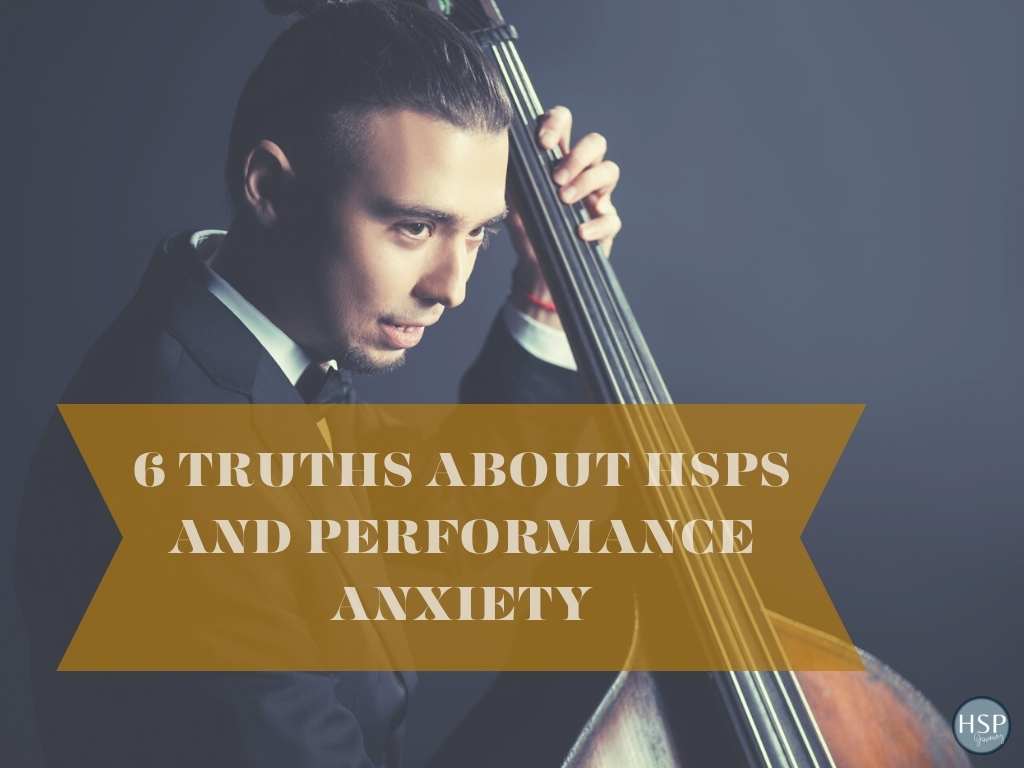Many highly sensitive people (HSPs) are caught between their natural creativity and their painful anxiety about sharing their creations with the world. One of my specialties is helping HSPs untangle the knots of performance anxiety. Here’s what you need to know about HSPs and performance anxiety to start to set yourself free.

Table of Contents
What Performance Anxiety Is and Is Not
Despite the name, performance anxiety is not a medical diagnosis. It refers to the physical, emotional, mental, and behavioral experiences we have when we are sharing ourselves and our creations with other people. Some things people may experience include:
- Racing heart, shortness of breath, sweaty palms, shaky hands or voice, “butterflies”
- Nervousness, fear, dread, over-focusing on anxiety or numbing out to stop feeling it
- Worries, ruminations, a sense of hopelessness and/or helplessness
- Distraction, procrastination, and other kinds of avoidance
While some people refer to these unpleasant experiences as stage fright, performance anxiety is not limited to actors, musicians, and orators. We can experience performance anxiety any time we have an audience for what we are doing, making, or creating. And that audience may be real or could be the imaginary audience we conjure in our minds. Some common situations that may trigger performance anxiety include anxiety around making phone calls or sending emails, cooking for other people, inviting people to your home, socializing at important events, driving, and being evaluated at work or school.
Performance anxiety gets in the way of reaching our goals. We may procrastinate, avoid, miss deadlines, or stress ourselves and those around us. For HSPs who are drawn to living in alignment with their sense of purpose and meaning in life, it can be almost painful to feel so clear on what we want to accomplish, but unable to get there.
My clients often have the belief that, once they have “done the thing”—landed the lead role, published the book, hosted the event—their performance anxiety will go away. Unfortunately, that’s not how it works. Performance anxiety is not related to one’s level of accomplishment. Some of the most outwardly successful people I know, who are consistently accomplishing their performance goals, still feel performance anxiety regularly. That’s because the anxiety is not based on the reality of what we are capable of doing, but on our concerns about how we will be perceived and received by others.
Truth #1 – Why Performance Anxiety Hits HSPs Especially Hard
What Elaine Aron refers to as the DOES traits of highly sensitive people sheds light on why performance anxiety is so common and why it is so hard for HSPs to overcome.
Depth of Processing: we think a lot about our experiences and do tremendous mental preparation before taking outward action. This internal landscape is filled with chances to fall down the rabbit hole of performance anxiety.
Overstimulation: we are prone to becoming overwhelmed by the inevitable variety of internal and external stimulation that arises when we are called upon to perform. Being in a performing role may not be conducive to using the strategies we ordinarily use to self-soothe.
Empathy: our ability to respond deeply to emotions means that we feel performance anxiety with a sharp sting. We also can be very attuned to how others perceive our performance and may detect and react strongly to even small signs of criticism, questioning, or disinterest.
Sensitive to Subtleties: because we notice very subtle details, HSPs are often the first to point a self-critical finger at ways that we believe our performance doesn’t measure up to our ideals. These “flaws” or inadequacies in our performance may not be discernible to other people but are magnified in our minds.
Truth #2 – High Sensation Seeking and Performance Anxiety
For the estimated 30% of HSPs who are also high sensation seekers (HSS), the desire for novelty and intensity may fuel their engagement in performance activities. However, HSS are just as likely as other HSPs to experience the challenges of performance anxiety. This tendency to desire the very thing that ends up feeling overwhelming means that HSS can feel particularly squeezed by internal conflict about performing.
Truth #3 – Manage Performance Anxiety
The fact that you are an HSP, even an HSS, does not mean that you are destined to be controlled by performance anxiety. You may be someone who always feels it, but you can choose to learn skills to keep it from stopping you from making progress toward your goals. Here are steps I recommend to my clients, based on my Singularly Sensitive approach to working with HSPs:
Truth #4 – Explore Your Performance Anxiety
Because of how uncomfortable performance anxiety can be, many people try to avoid feeling it or thinking about it. All this does is keep it shrouded in mystery, a force that can overtake us when we most want to get something accomplished. Instead of avoiding your performance anxiety, get to know it deeply.
Go back and look at the list of ways I shared about what people experience. How does your performance anxiety show up? What do you notice happens first when you start to work toward your goals? How does this experience evolve over time? When does your performance anxiety subside and what helps it go away?
Bringing a mindful, curious eye to your performance anxiety can shine light on places where you might begin to make changes in how you respond to it. It can also foster a sense of self-compassion for the ways that this phenomenon is a painful yet all-to-human condition.

Truth #5 – Experiment with Expectations
Once you have a refreshed vision of how your performance anxiety shows up, you can begin to experiment with changing what you do in response to it. Maybe you start by acknowledging to yourself and to other people that you are having this experience. Breaking the secrecy and shame about performance anxiety has been powerfully transformative for many of my clients. You might also begin to identify strategies that have worked in the past or in other situations that you can adapt and apply to your current struggles.
This is a time to lean into your creativity and perceptiveness as an HSP. You probably know what you need and have a lot of ideas about how to get that need met. Give it a try. The worst thing you can do is continue to do the same old things that have kept you locked in performance anxiety in the past. Even if your new approach has mixed results or is a flop, you’re just gathering information that can help you in the future.
Truth #6 – Integrate and Process
The integration stage invites you to use your deep processing skills to reflect on all the data you’ve gathered from the exploring and experimenting phases. At this stage, journaling can be very helpful in synthesizing what you are learning about yourself into a plan to prevent and to cope with performance anxiety. What’s most important is that this plan is unique to you. A one-size-fits-all approach is not going to let you move past performance anxiety and reach your goals.
Truth #7 – You Are Not Your Performance Anxiety
The longer we struggle with performance anxiety, the more it can seem like it is central to our identity as an artist, speaker, or craftsperson. You are not your anxiety. It does not have to define you or stop you from your accomplishments. I can personally attest to doing many things professionally and in my hobby as a photographer where I have felt an agonizing level of performance anxiety…but I have also done what I set out to do.
There’s nothing special about me, except that I’ve figured out what I need to keep my performance anxiety from ruling my life. Let’s connect and figure out how to help you do the same.
Be sensitive, be free
*This post contains affiliate links and I will be compensated if you make a purchase after clicking on my links*





[…] through the issues performing in front of people brought up for me. Though I suffered massive performance anxiety as a child, it’s gratifying that I was able to overcome and manage my anxiety during my adult […]